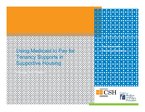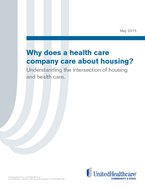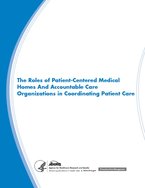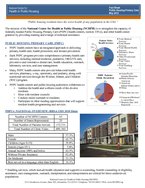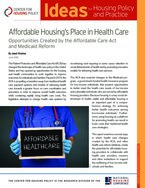Found 30 resources.
0
0
0
The Legal Bibliography is collection of 100+ papers, toolkits and other materials focused on privacy, consent and policy documentation. Co-developed by the Network for Public Health Law and Data Across Sectors for Health (DASH), the Bibliography is a growing resource for lawyers and community data practitioners, intended to support local collaboratives in their efforts to share data across sectors.
Topics: Criminal justice, Data sharing, Education, Health, Homelessness, Housing, Mental health, Partnerships, Safety
 Shared by Housing Is
on Apr 8, 2019
Shared by Housing Is
on Apr 8, 2019 0
0
0
As the population ages, one of the greatest challenges facing state officials is how to organize and pay for long-term services and supports (LTSS) for low-income elderly and disabled adults—the most complex, expensive, and fastest-growing group covered by Medicaid. To help address this challenge, a toolkit for state leaders published in 2017 has been updated.
Topics: Disabilities, Health, Low-income, Medicaid / Medicare, Partnerships, Seniors
 Shared by Housing Is
on Mar 26, 2019
Shared by Housing Is
on Mar 26, 2019 0
0
0
After working with 37 communities across the country over the last three years to drive sustainable improvements in community health we’ve we’ve seen how when specific approaches are implemented, namely Bold, Upstream, Integrated, Local, and Data-Driven approaches, meaningful change affecting the health of a community can happen. We’ve done our best to document the processes, the successes, and the failures along the way, and from those real-world experiences we’ve created a set of preliminary tools that can inform and guide those interested in learning about the unique BUILD approach.
Topics: Community development, Data sharing, Health, Partnerships
 Shared by Housing Is
on Mar 19, 2019
Shared by Housing Is
on Mar 19, 2019 0
0
0
The NQP Social Determinants of Health Data Integration Action Team brings together experts and recognized leaders from the private and public sectors committed to accelerating the integration of data on social determinants of health (SDOH) into clinical practice. Through a series of web meetings and one in-person forum, the NQP Social Determinants of Health Data Integration Action Team Action Team will develop and share successful approaches to integrating SDOH data to support providers and communities in their efforts to eliminate disparities.
Topics: Data sharing, Health, Partnerships, Racial inequalities, Research
 Shared by Housing Is
on Mar 18, 2019
Shared by Housing Is
on Mar 18, 2019 0
0
0
On behalf of All In: Data for Community Health, Data Across Sectors for Health (DASH) is conducting The 2019 National Inventory of Data Sharing Collaborations for Health to better understand the location and nature of multi-sector collaborations in the United States, their capacity for data-sharing to improve health, and to assess progress in this field among multi-sector collaborations. Your participation in The National Inventory will also help us identify areas for further learning and opportunities to support and expand these activities. All In: Data for Community Health is a learning...
Topics: Data sharing, Health, Partnerships, Research
 Shared by Housing Is
on Mar 13, 2019
Shared by Housing Is
on Mar 13, 2019 0
0
0
Through our conversations with King County, Seattle, Tacoma, and Vancouver Housing Authorities, as well as Home Forward, Portland’s housing authority, and partners from school districts, out-of-school time programs, and community-based organizations, we learned why they endeavored to better intersect housing and education, elements of a successful partnership, lessons learned, their challenges, and how the work can be replicated. We hope this will be a resource for other individuals and communities as they begin and strengthen partnerships of their own in order to improve life outcomes for...
Topics: CLPHA, Education, Housing, Out-of-school time, Partnerships, Place-based
0
0
0
Health departments provide public health protections in a number of areas, including: preventing the spread of communicable disease, ensuring food, air, and water quality are safe, supporting maternal and child health, improving access to clinical care services, and preventing chronic disease and injury. In addition, public health departments provide local protections and services unique to their community’s needs.
Topics: Data sharing, Health, Metrics, Partnerships
 Shared by Housing Is
on Dec 17, 2018
Shared by Housing Is
on Dec 17, 2018 0
0
0
Long-term, sustainable financing is a major challenge for the majority of multisector partnerships, and the organizations aligned with them, in regions across the country. Many depend overwhelmingly on short-term sources of funding—namely, grants. It’s time to explore new financing frontiers!
Topics: Funding, Partnerships
 Shared by Housing Is
on Dec 17, 2018
Shared by Housing Is
on Dec 17, 2018 0
0
0
The 2018 Purpose Built Conference in Orlando, Florida from October 24 – 26 was a tremendous opportunity for thoughtful engagement and energetic conversations with Network Members and attendees from all across the country. Our panel of guest speakers represented a wide range of industries and brought unique perspectives and insights.
Topics: Community development, Education, Health, Housing, Low-income, Mobility, Partnerships, Place-based
0
0
0
With political divisions on the rise and global cooperation imperiled, city officials worldwide are stepping up to lead, solving local problems while sharing solutions and innovations across borders. Making cities such as New York, Pittsburgh, and Los Angeles inclusive, safe, and sustainable is vital to the future of the United States—and the globe. Driven by the need to act locally while thinking globally, a growing number of metro areas are adapting the Sustainable Development Goals (SDGs) as a blueprint for progress.
Topics: Community development, Housing, Partnerships, Place-based, Sustainability
0
0
0
Resources for integrating resiliency, hope, and wellness in schools
Topics: Child welfare, Low-income, Partnerships, Place-based, Research, Safety
0
0
0
After decades of sprawl and suburban dominance, U.S. cities are experiencing rebounding populations, growing employment, and new public and private sector investments in places that are walkable, transit-oriented, and support diverse people and amenities. But we know that the benefits of these trends are not equally distributed, presenting an urgent opportunity for local and regional leaders to advance place-led development that produces better economic outcomes for more people in more places.
To help deliver on that imperative, the Metropolitan Policy Program at Brookings launched the...
Topics: Community development, Housing, Partnerships, Place-based, Safety, Stability
0
0
0
Colleges and higher education systems can make institutional policy changes to bolster the success of students who are parents and their families through intentional use of a two-generation approach. This brief focuses on traditional two-year and four-year baccalaureate pathways for students who are parents; it complements a brief released on policy solutions.
Topics: Dual-generation, Education, Low-income, Partnerships, Post-secondary, Youth
0
0
0
There are opportunities for federal and state policies to better support postsecondary institutions in serving students who are parents and their families. Policymakers can incentivize partnerships, name students who are parents as special or target populations, and facilitate financial aid processes that address the needs of families. Where possible, policies can also encourage creative and innovative approaches to leveraging existing programs to facilitate access and successful completion for parenting students. These recommendations seek to promote policy changes that address the critical...
Topics: Dual-generation, Education, Legislation & Policy, Partnerships, Post-secondary, Research, Workforce development, Youth
0
0
0
It’s no secret that survivors of domestic and sexual violence make up a large percentage of the families and individuals who seek help from the homeless/housing services system. No one expects homeless/housing programs to become an extension of the victim services system. But the intersection between homelessness and domestic and sexual violence requires both systems to do their work with that reality in mind.
Topics: Child welfare, Domestic violence, Homelessness, Housing, Legislation & Policy, Partnerships, Safety
0
0
0
The NYU Furman Center and Abt Associates have launched LocalHousingSolutions.org, an online, interactive resource to help communities create and implement comprehensive local housing strategies that promote housing affordability. CLPHA was involved with the design of the site as one of forty housing industry stakeholders selected to participate in the National Community of Practice on Local Housing Policy.
Local Housing Solutions offers a new framework for helping cities address affordability challenges as part of a comprehensive and balanced housing strategy. These challenges are complex...
Topics: CLPHA, Housing, Low-income, Partnerships, Research
0
0
0
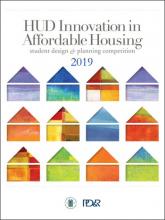
HUD’s Office of Policy Development and Research (PD&R) is pleased to announce the 2019 Innovation in Affordable Housing (IAH) Student Design and Planning Competition. The competition encourages multidisciplinary graduate student teams to submit innovative solutions for a real-world affordable housing project that incorporate design, planning, finance, and larger community elements.
Topics: Funding, Housing, Low-income, Partnerships, Research
0
0
0
Partnerships between medicaid and supportive housing providers
Topics: Cost effectiveness, Funding, Health, Legislation & Policy, Low-income, Medicaid / Medicare, Partnerships, Supportive housing
 Shared by Housing Is
on Aug 9, 2018
Shared by Housing Is
on Aug 9, 2018 0
0
0
In a post health care reform era, Medicaid programs need to build system capacity to effectively manage increasingly complex Medicaid populations while simultaneously seeking innovative solutions to reduce costs and improve access. As states are increasingly becoming more reliant upon managed care for complex populations – such as individuals in need of long-term services and supports, those with intellectual or developmental disabilities, individuals with severe and persistent mental illness, as well as children with special health care needs – the needs of these populations range far beyond...
Topics: Funding, Health, Housing, Low-income, Medicaid / Medicare, Partnerships
 Shared by Housing Is
on Aug 9, 2018
Shared by Housing Is
on Aug 9, 2018 0
0
0
Social determinants of health are the economic and social conditions that affect health outcomes and are the underlying, contributing factors of health inequities. Examples include housing, educational attainment, employment and the environment.
Topics: Affordable Care Act, Disabilities, Health, Homelessness, Housing, Low-income, Medicaid / Medicare, Mental health, Partnerships, Place-based, Substance abuse, Supportive housing
 Shared by Housing Is
on Aug 9, 2018
Shared by Housing Is
on Aug 9, 2018 0
0
0
The effective coordination of a patient’s health care services is a key component of high quality and efficient care. In this brief we first describe the goals of care coordination and the central role for primary care, followed by the specific activities involved in care coordination. Next we summarize the evidence on the effectiveness of different care coordination activities that PCMHs and ACOs can pursue. Finally, we suggest roles for PCMHs and ACOs in coordinating care and summarize key points.
Topics: Data sharing, Health, Partnerships, Preventative care
 Shared by Housing Is
on Jul 27, 2018
Shared by Housing Is
on Jul 27, 2018 0
0
0
Public Housing Primary Care (PHPC) health centers have an integrated approach to delivering primary health care, health promotion, and disease prevention. PHPC health centers work closely with public housing authorities to address the health and wellness needs of the diverse residents.
Topics: Funding, Health, Housing, Low-income, Mental health, Partnerships, Place-based
 Shared by Housing Is
on Jul 23, 2018
Shared by Housing Is
on Jul 23, 2018 0
0
0
Kaiser Permanente NW Community Benefit intends to award at least $1.5 million in community grants to support organizations that help people with behavioral health challenges to secure and maintain safe, stable housing. A minimum of five grants of up to $325,000 will be awarded for projects lasting 3 ½ years. Projects must include the involvement of peers or community health workers (CHWs) and must involve collaboration between housing providers, health care providers (including behavioral health service providers) and those community organizations employing peers or CHWs.
Topics: Funding, Health, Homelessness, Housing, Mental health, Pacific Northwest, Partnerships, Place-based, Preventative care, Substance abuse
 Shared by Housing Is
on Jul 20, 2018
Shared by Housing Is
on Jul 20, 2018 0
0
0
This report examines several ways in which health care changes created by the ACA, and other health care reform initiatives, create the potential for affordable housing providers to collaborate with health care providers, insurers, and other institutions to support the wellbeing of low-income individuals and families.
Topics: Affordable Care Act, Health, Homelessness, Housing, Legislation & Policy, Low-income, Medicaid / Medicare, Partnerships
 Shared by Housing Is
on Jul 20, 2018
Shared by Housing Is
on Jul 20, 2018 0
0
0
The Denver Social Impact Bond program is an initiative aimed at measurably improving the lives of people most in need by driving resources towards better, more effective programs. Social Impact Bonds are a unique type of performance-based contract where private and/or philanthropic lenders loan funds to accomplish a specific objective and are repaid based on whether the program achieves its goals. Denver’s Social Impact Bond program will use funds from lenders to provide housing and supportive case management services to at least 250 homeless individuals who frequently use the city’s...
Topics: Community development, Cost effectiveness, Criminal justice, Health, Homelessness, Housing, Low-income, Mental health, Partnerships, Stability, Substance abuse, West Coast
 Shared by Housing Is
on Jul 17, 2018
Shared by Housing Is
on Jul 17, 2018 
